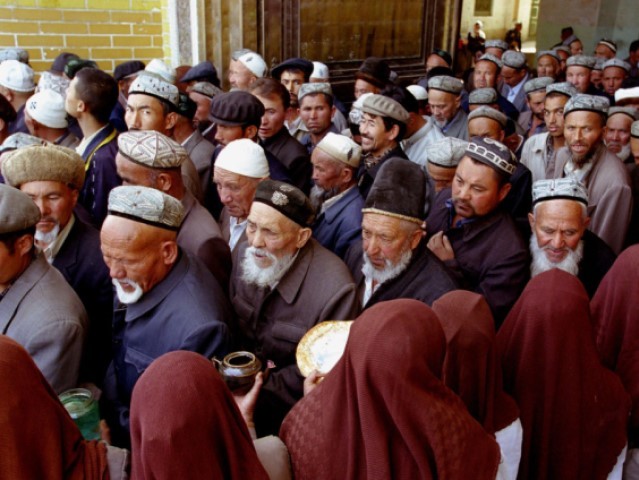The Washington Post reported Tuesday that China’s massive Huawei telecom company helped to develop an artificial intelligence system that can scan crowds of people and identify them by age, sex, and race.
The system was reportedly programmed to send “Uyghur alarms” to the police when members of that oppressed minority were spotted by security cameras.
The report was based on a document signed by Huawei representatives and uncovered by an independent Pennsylvania-based research organization called IPVM that specializes in video surveillance technology.
The document describes Huawei working with a startup company called Megvii in 2018 to develop a facial recognition system that could determine the ethnicity of all the people in a crowd, with special flags for Uyghur faces. The ethnic identification system and Uyghur alarm were described as “basic functions” of the Megvii facial recognition system that were tested and “verified” by Huawei technicians.
“In this interoperability test, Huawei and Megvii jointly provided a face recognition solution based on Huawei’s video cloud solution. In the solution, Huawei provided servers, storage, network equipment, its FusionSphere cloud platform, cameras and other software and hardware, [while] Megvii provided its dynamic facial recognition system software,” said the document, as quoted and translated by IPVM.
Huawei and Megvii have publicly unveiled three joint surveillance projects since 2018, but it was not clear if the “Uyghur alarm” code was incorporated into any of them. IPVM noted that at least a dozen Chinese police departments are known to use video surveillance systems that can identify Uyghur faces. Megvii was identified by the New York Times in 2019 as one of the companies that provides software capable of spotting Uyghurs in a crowd.
The Washington Post reported that both Huawei and Megvii admitted the document is authentic, with a Huawei spokesman dismissing it as “simply a test” of a product that never became a “real-world application” – but the paper was scrubbed from Huawei’s website soon after the Post and IPVM asked the company to comment on it. The “Uyghur alarm” project report was discovered in a public folder on Huawei’s website, even though it was marked “Huawei confidential, prohibited to spread without permission.”
“The Chinese tech giant didn’t explain why it would need to test a technology designed to target an oppressed minority group,” C/Net sardonically observed on Tuesday.
“Megvii didn’t respond to a request for comment but told IPVM that its technology is ‘not designed or customized to target or label ethnic groups,’ despite the test with Huawei involving just that,” C/Net added, even more sardonically.
IPVM founder John Honovich said that contrary to Huawei’s demurrals, Chinese tech companies are involved in “systematic” efforts to refine artificially-intelligent surveillance systems, and the 2018 project outlined in the document IPVM uncovered was more than mere speculation.
“A lot of thought went into making sure this ‘Uyghur alarm’ works,” Honovich said.
The Washington Post supported Honovich’s assertion by pointing out that other Chinese research papers covering ethnic identification through facial-recognition software have been uncovered, many of them specifically referring to the Uyghurs as a race of particular concern. Chinese researchers also seem interested in identifying Tibetan and Korean faces and distinguishing them from the dominant Han Chinese ethnicity.
Megvii, which has become a leading developer of facial recognition systems, is one of eight Chinese companies sanctioned by the Trump administration for aiding and abetting China’s persecution of the Uyghurs and other minorities. Another blacklisted company, Hikvision – currently the largest global provider of video surveillance equipment – was caught by IPVM marketing a system that could identify Uyghur faces in November 2019. Hikvision scrubbed its advertisement for this product, which had been on sale for at least seven months, after IPVM asked the company about it.
Huawei is also under U.S. sanctions due to concerns about Chinese intelligence services compromising the security of its products.
Human rights advocates told the Washington Post that not only is China’s high-tech persecution of its minority populations atrocious on its own, but the technology will likely be sold to other countries that have keen interests in monitoring the activities of their minority populations. The more pessimistic human rights groups believe this would ultimately include almost every government in the world.
There are good reasons to be concerned about Chinese A.I. and surveillance technology spreading around the world, including to Western nations. The Chinese Communist Party (CCP) began holding an annual “World Artificial Intelligence Conference” in 2018. The conference, which features high-level CCP officials as speakers, is sponsored by Huawei and other Chinese tech giants. Attendees include representatives from Amazon, Apple, Microsoft, and other major Western tech firms.

COMMENTS
Please let us know if you're having issues with commenting.